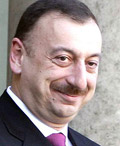An unofficial meeting of Armenian and Azerbaijani presidents Robert Kocharyan and Ilham Aliev was expected to take place last week. It was supposed to take place during the unofficial summit of the presidents of the CIS countries in Doni Rostov, where the horse races for the Russian president’s championship cup were taking place. The expectations grew even more when it became clear that not all CIS presidents were going to participate in the event. However, the discussion did not take place, despite the fact that Russian President Vladimir Putin, presidents of Moldova and Uzbekistan Vladimir Voronin and Islam Karimov, and even the Armenian and Azerbaijani presidents had all gathered around one table. According to eyewitnesses, the presidents were silent, focused on the horse race, and even if they were distracted, they were only talking with the people sitting next to them.
All we can do is express sorrow, especially since on the previous day the delegation headed by the ambassadors of Armenia and Azerbaijan to Russia, Armen Smbatyan and Polad Byulbyuloghli, and composed of the representatives of the intelligentsia of both countries, had arrived in Karabakh. It would be naïve to think that the scientists and artists would be successful in registering progress in the negotiations process, but their joint visit may be observed as a sign to the Armenian and Azerbaijani societies as a call to revise their positions regarding each other. But not everything is that clear here. Whereas in Yerevan the action was accepted if not positively, then at least neutrally, in Baku the Azerbaijani delegation was fired with accusations, while the press conference of Polad Byulbyuloghli was about to fail, due to the representatives of the radical parties which claim that Nagorno-Karabakh must quickly be made part of Azerbaijan.
However, their visit to Stepanakert proved once again how far the two societies are from that, how unready they are to restore peace, confidence and good relations. The positions of the sides exclude each other. The Armenian side is talking respectfully about the elections in Stepanakert, while the Azerbaijani side is talking about territorial integrity. What else can we demand of the politicians who are the slaves of the created situation? It is nonsensical to demand any progress from them. That became clear once again after Ilham Aliev’s speech upon his return from Rostov and the meeting with the representatives of the intelligentsia in Baku.
“The voluntary liberation of the seized lands on the part of Armenia is the only way to avoid the restart of a war in Nagorno-Karabakh,” announced Aliev, adding: “Armenia must remove its forces from the lands which don’t belong to it. Only then will there be no war.” He also said that Azerbaijan will never cope with the seizure of its lands and must liberate them no matter what it takes, in the extreme case even through military operations, regardless of the possible negative consequences.
“Nobody wants losses, but we are gathering strength and are ready for any operation at any given time. Azerbaijan will never agree to maintain the status-quo,” underlined the president.
Russian politician Yevgeni Zhilin draws attention to the fact that this is not the first time that the president of Azerbaijan is making such an announcement, and this sort of bellicose speech is usually heard right after Armenian-Azerbaijani meetings.
“Those announcements made at any level are not practical, and don’t lead to any progress when it comes to the conflict settlement issue. Those speeches, in particular the actual situation of Nagorno-Karabakh, reflect negatively on the president’s rating, and although Aliev has no real opponents, he is forced to make threatening announcements; otherwise, the people of Azerbaijan will cease to “understand” him. In fact, perhaps it would be justified to talk not only about the need for such announcements, rather the possibility of the process of events,” he said.
According to the politician, the arms race may be observed as an alarming factor, but the large amount of weaponry at the hands of Armenia and Azerbaijan wasn’t just procured by accident. The two countries are incapable of carrying out long-term military operations, and that is a different story; it is impossible to solve the Karabakh issue in a matter of days. So, in the worst case scenario, there may be short-term military operations, but that cannot seriously change the status-quo.

